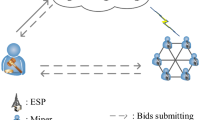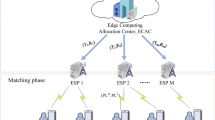Abstract
The core problem of blockchain is to solve the proof-of-work puzzle, which is a high energy-consumption task. To address the resource limit problem, the combination of blockchain and mobile edge computing (MEC) has attracted widespread concern. In this paper, we consider a resource trading problem for a MEC-enabled blockchain system with multiple miners and one edge computing service provider (ESP), in which ESP has no previous knowledge of miners’ private information. We focus on how to perform resource trading between miners and ESP to maximize ESP’s profit under incomplete information? To tackle this problem, the resource trading process is modeled as a monopoly market using contract theory. The ESP acts as a monopolist and needs to set a contract containing service time and price for the miners. The miners can be classified into multiple types based on the private information and select one contract item designed for its type. We first analyze the necessary and sufficient conditions for feasible contracts and derive the optimal contract that maximizes the ESP’s profit for complete information scenario. For incomplete information, the service demand and the number of transactions contained in the block are the private information of miners and not known by ESP, we explore the properties of a feasible contract to reduce the complexity and propose a Lagrange multiplier algorithm to obtain the optimal contract in this scenario. Finally, the feasibility and optimality of the contract have been shown through simulation results. In addition, our proposed method can achieve results close to that of complete information scenario and has a maximum performance improvement of 17.19% comparing with linear pricing strategy in incomplete information scenario.













Similar content being viewed by others
Availability of data and materials
All data, models, or code generated or used during the study are available from the corresponding author by request.
References
Pilkington M (2016) Blockchain technology: principles and applications, research handbook on digital transformations. In: Xavier Olleros F, Zhegu M (ed). Edward Elgar,
Yang R, Yu FR, Si P, Yang Z, Zhang Y (2019) Integrated blockchain and edge computing systems: a survey. IEEE Commun Surv Tutor Some Res Issues Challenges 21(2):1508–1532
Pass R, Shi E (2017) Fruitchains: a fair blockchain. In: Proceedings of the ACM Symposium on Principles of Distributed Computing, Washington, DC, July 25–27, 315–324
Mauro C, Kumar ES, Chhagan L, Sushmita R (2018) A survey on security and privacy issues of bitcoin. IEEE Commun Surv Tutorials 20(4):3416–3452
Christidis K, Devetsikiotis M (2016) Blockchains and smart contracts for the internet of things. IEEE Access 4:2292–2303
Wang T, Bai X, Wang H, Liew SC, Zhang S (2020) Game-theoretical analysis of mining strategy for bitcoin-ng blockchain protocol. IEEE Syst J 15(2):2708–2719
Hieu NQ, Anh T, Luong NC, Niyato D, Kim DI, Elmroth E (2020) Resource management for blockchain-enabled federated learning: a deep reinforcement learning approach.
Fan Y, Wang L, Wu W, Du D (2021) Cloud/edge computing resource allocation and pricing for mobile blockchain: an iterative greedy and search approach. IEEE Trans Comput Soc Syst 8(2):451–463
Jiang S, Wu J (2020) A game-theoretic approach to storage offloading in poc-based mobile blockchain mining. In: Proceedings of the Twenty-First International Symposium on Theory, Algorithmic Foundations, and Protocol Design for Mobile Networks and Mobile Computing, 171–180
Aldmour R, Yousef S, Yaghi M, Tapaswi S, Pattanaik KK, Cole M (2017) New cloud offloading algorithm for better energy consumption and process time. Int J Syst Assur Eng Manag 8(2):730–733
Mach P, Becvar Z (2017) Mobile edge computing: a survey on architecture and computation offloading. IEEE Commun Surv Tutor 19(3):1628–1656
Huang X, Gong S, Yang J, Zhang W, Yang L, Yeo CK (2022) Hybrid market-based resources allocation in mobile edge computing systems under stochastic information. Futur Gener Comput Syst 127:80–91
Abbas N, Zhang Y, Taherkordi A, Skeie T (2018) Mobile edge computing: a survey. IEEE Internet Things J 5(1):450–465
Chen X, Cai Y, Shi Q, Zhao M, Champagne B, Hanzo L (2020) Efficient resource allocation for relay-assisted computation offloading in mobile-edge computing. IEEE Internet Things J 7(3):2452–2468
Yan J, Bi S, Zhang YJA (2020) Offloading and resource allocation with general task graph in mobile edge computing: a deep reinforcement learning approach. IEEE Trans Wireless Commun 19(8):5404–5419
Xiong Z, Zhang Y, Niyato D, Wang P, Zhu Han (2018) When mobile blockchain meets edge computing. IEEE Commun Mag 56(8):33–39
Zamani AR, Zou M, Diaz-Montes J, Petri I, Rana O, Anjum A, Parashar M (2020) Deadline constrained video analysis via intransit computational environments. IEEE Trans Serv Comput 13(1):59–72
Sun H, Zhou F, Hu RQ (2019) Joint offloading and computation energy efficiency maximization in a mobile edge computing system. IEEE Trans Veh Technol 68(3):3052–3056
Liu X, Wu J, Chen L, Xia C (2019) Efficient auction mechanism for edge computing resource allocation in mobile blockchain. In: 2019 IEEE 21st International Conference on High Performance Computing and Communications; IEEE 17th International Conference on Smart City; IEEE 5th International Conference on Data Science and Systems (HPCC/SmartCity/DSS), Zhangjiajie, China
Patrick B, Mathias D, Patrick B (2005) Contract theory.
Lin G, Wang X, Xu Y, Qian Z (2011) Spectrum trading in cognitive radio networks: a contract-theoretic modeling approach. IEEE J Sel Areas Commun 29(4):843–855
Wang J, Li J, Gao Z, Han Z, Wang X (2021) Resource management and pricing for cloud computing based mobile blockchain with pooling. IEEE Trans Cloud Comput 18:1–1
Houy N (2014) The bitcoin mining game. Ledger J 1(13):53–68
Oualhaj OA, Mohamed A, Guizani M, Erbad A (2020) blockchain based decentralized trust management framework. In: 2020 International Wireless Communications and Mobile Computing (IWCMC), 2210–2215
Xiong Z, Kang J, Niyato D, Wang P, Poor HV (2020) Cloud/edge computing service management in blockchain networks: multi-leader multi-follower game-based ADMM for pricing. IEEE Trans Serv Comput 13(2):356–367
Mao Y, You C, Zhang J, Huang K, Letaief KB (2017) A survey on mobile edge computing: the communication perspective. IEEE Commun Surv Tutor 19(4):2322–2358
Ali Z, Jiao L, Baker T, Abbas G, Abbas ZH, Khaf S (2019) A deep learning approach for energy efficient computational offloading in mobile edge computing. IEEE Access 7:149623–149633
Aldmour R, Yousef S, Baker T, Benkhelifa E (2021) An approach for offloading in mobile cloud computing to optimize power consumption and processing time. Sustain Comput Inf Syst 31:100562
Miao Y, Wu G, Li M, Ghoneim A, Al-Rakhami M, Hossain MS (2020) Intelligent task prediction and computation offloading based on mobile-edge cloud computing. Futur Gener Comput Syst 102:925–931
Liu M, Yu FR, Teng Y, Leung VCM, Song M (2018) Computation offloading and content caching in wireless blockchain networks with mobile edge computing. IEEE Trans Veh Technol 67(11):11008–11021
Wu Y et al (2018) Optimal computational power allocation in multi-accessmobile edge computing for blockchain. Sensors 18(10):3472
Zheng J, Cai Y, Wu Y, Shen X (2018) Dynamic computation offloading for mobile cloud computing: a stochastic game-theoretic approach. IEEE Trans Mob Comput 18(4):771–786
Hong Z, Chen W, Huang H, Guo S, Zheng Z (2019) Multi-hop cooperative computation offloading for industrial IoT-edge-cloud computing environments. IEEE Trans Parallel Distrib Syst 30(12):2759–2774
Dhamal S, Ben-Ameur W, Chahed T, et al. (2018) A stochastic game framework for analyzing computational investment strategies in distributed computing.
Xiong Z, Feng S, Niyato D, Wang P, Han Z (2018) Optimal pricing-based edge computing resource management in mobile blockchain. In: 2018 IEEE International Conference on Communications (ICC), 1–6
Xiong Z, Feng S, Wang W, Niyato D, Wang P, Han Z (2019) Cloud/fog computing resource management and pricing for blockchain networks. IEEE Internet Things J 6(3):4585–4600
Jiao Y, Wang P, Niyato D, Xiong Z (2018) Social welfare maximization auction in edge computing resource allocation for mobile blockchain. In: 2018 IEEE International Conference on Communications (ICC), 1–6
Baek B, Lee J, Peng Y, Park S (2020) Three dynamic pricing schemes for resource allocation of edge computing for IoT environment. IEEE Internet Things J 7(5):4292–4303
Luong N. C, Xiong Z, Wang P, Niyato D (2018) Optimal auction for edge computing resource management in mobile blockchain networks: a deep learning approach. In: 2018 IEEE International Conference on Communications (ICC), 1–6
Houy N (2014) The Economics of Bitcoin Transaction Fees, Working Paper GATE 2014-07, halshs-00951358
Zhang Y, Song L, Saad W, Dawy Z, Han Z (2015) Contract-based incentive mechanisms for device-to-device communications in cellular networks. IEEE J Sel Areas Commun 33(10):2144–2155
Yang C, Lou W, Liu Y, Xie S (2020) Resource allocation for edge computing-based vehicle platoon on freeway: a contract-optimization approach. IEEE Trans Veh Technol 69(12):15988–16000
Funding
This work is supported by the Nature Science Foundation of Fujian Province (Grant No.2021J011002, No.2021J011004, No.2020J01813), and the Humanities and Social Science Foundation of Ministry of Education (Grant No.20YJC870002).
Author information
Authors and Affiliations
Contributions
YL wrote fifty percentage of the manuscript, performed mathematical modeling design and construction, and also conducted part of the experiment. ZL contributed to the conception of the study and wrote fifty percentage of the manuscript. WZ contributed significantly to analysis and algorithms design. YZ performed the data analyses and English grammar checking. JY helped perform the analysis with constructive discussions and improved the English grammar and checked spelling.
Corresponding author
Ethics declarations
Competing interests
The authors declared that they have no competing interests to this work. We declare that we do not have any commercial or associative interest that represents a conflict of interest in connection with the work submitted.
Ethical approval
Not applicable.
Additional information
Publisher's Note
Springer Nature remains neutral with regard to jurisdictional claims in published maps and institutional affiliations.
Ziqiong Lin, Wenjie Zhang, Yifeng Zheng and Jingmin Yang have contributed equally to this work.
Rights and permissions
Springer Nature or its licensor (e.g. a society or other partner) holds exclusive rights to this article under a publishing agreement with the author(s) or other rightsholder(s); author self-archiving of the accepted manuscript version of this article is solely governed by the terms of such publishing agreement and applicable law.
About this article
Cite this article
Li, Y., Lin, Z., Zhang, W. et al. Mobile edge computing-enabled blockchain: contract-guided computation offloading. J Supercomput 79, 7970–7996 (2023). https://doi.org/10.1007/s11227-022-04990-7
Accepted:
Published:
Issue Date:
DOI: https://doi.org/10.1007/s11227-022-04990-7




